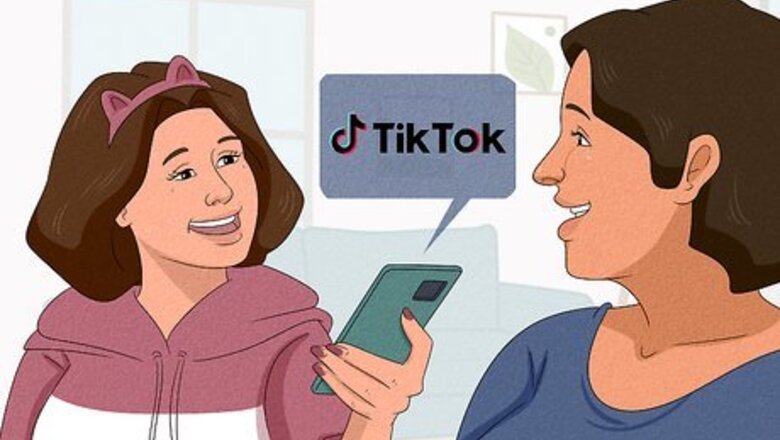
views
Mastering Gen Z Expressions and Vocabulary
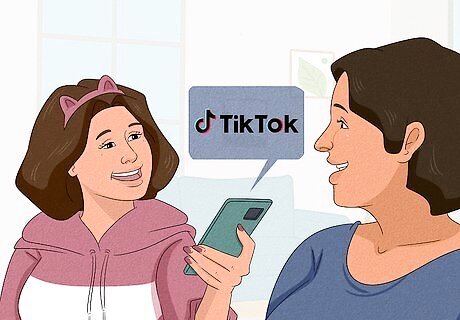
Learn words and phrases that are from TikTok. These terms originated from the social media app TikTok. Practice reading sentences and conversations with these terms to understand slang today. If you want to, practice using these terms in place of your preferred words in daily conversation. However, try to only use these words in informal conversations, as these words can be inappropriate in formal settings, such as work and during class. Cap - a lie. Some common phrases where it is used include "no cap" and "cappin' ". That song was fire, no cap. Cheugy - Trying too hard to be cool or trendy (usually describe older generations). That person's so cheugy- they've been practicing TikTok dances for days! Ded - an intentional misspelling of "dead". Used to describe when someone finds something so funny that they are metaphorically "dead". I'm ded ???????????????? What was that?!" Hits different - used to describe something that feels better under certain conditions. Sipping hot chocolate near a warm fireplace during the winter just hits different. Living rent free - used to describe something that is stuck in your head. In other words, something that you can't stop thinking about. Anime clips live rent free in my head. Skill issue - used to blame someone for their own loss. Basically, it means that a person's loss is because they are incompetent. That homework was so hard! It took me an hour to complete. Skill issue. Sturdy - used to describe someone's dance moves. It's usually used in the phrase "get sturdy", which means that someone is performing a specific type of dance in which they move their legs, spin, and hop. Woah, the person in the video's getting sturdy! Look at those moves! Valid - understandable or excellent. That statement about them being the most popular is valid. Vibe check - a check of someone's personality and/or energy. Just went out on a date with her, and she passes my vibe check.

Learn words and phrases from other social media apps. These terms originated from social media apps other than TikTok, such as Twitter, YouTube, and Instagram. Practice reading sentences and conversations with these terms to understand slang today. If you want to, practice using these terms in place of your preferred words in daily conversation. However, try to only use these words in informal conversations, as these words can be inappropriate in formal settings, such as work and during class. Bozo - a stupid person. What a bozo we met yesterday! She didn't even know how to tie her shoelaces! Bussin' - excellent or great. That Mexican cuisine we ate yesterday was bussin'! Chad - a physically attractive male. Wow, he was such a chad! Mald - a combination of the words "mad" and "bald". It is used to humorously describe a person who is both mad and balding, although non-balding people can also use it. I'm malding so bad right now- they just lost the game by 40 points!!! Menace - a trouble-making and mischievous person. That kid was such a menace- he stuck toilet paper to the walls of the bathroom at school! Mid - mediocre or "middle". It's used to describe things that are "just average" or slightly below average. That pasta was quite mid. Ratio - the ratio of more comments and replies than likes about the original post. It's used to signify that a post is unpopular, with all the comments criticizing the post. Common usages of the word include ratio'd and L + ratio. "L + ratio" means that the post is particularly bad (as "L" means loss"). Rizz - romantic charisma. This word is usually used to describe a male person's ability to attract females. You got ten love notes on your locker yesterday for Valentine's Day?! Bro has that rizz!

Learn words and phrases that are from video games. Gaming is also popular with Generation Z, so many Gen Z gamers get slang from video games. Practice reading sentences and conversations with these terms to understand slang today. If you want to, practice using these terms in place of your preferred words in daily conversation. However, try to only use these words in informal conversations, as these words can be inappropriate in formal settings, such as work and during class. Carry - to help your teammates win a game. It is used to describe a person that helps the whole team win. It is typically used in gaming and sports. A common phrase where it is used is "hard-carry". My friend hard-carried that round. NPC - a non-playable character. This refers to characters in a video game who walk around and don't affect the gameplay nor the game itself. In slang, this refers to people who go about their daily lives like a robot or an NPC from a video game. That guy's such an NPC- he literally wears the same type of clothing every day!" Pro gamer move - a strategic action that yields excellent results. Wow, that really was a pro gamer move. Speedrun - to run or go through something as fast as possible. I'm currently speed-running homework since I got 10 assignments overdue, and I need to turn all this in before the end of the term. Sus - short for "suspicious". This term rose in popularity when the video game Among Us became popular. That seems pretty sus to me...are you sure nothing has been going on?

Study slang that came from previous generations. There are many important slang terms that are popular among Gen Z'ers that are unoriginal. A ton of the slang from Generation Z is borrowed from previous generations, like the Millennial or Gen X generations. You may have heard of some of these if you are a member of an older generation, so this may be a piece of cake. Bet - an expression of agreement or doubt. The word "bet" has opposite meanings; it could mean that someone agrees with something or that they express doubt about it, so they want to bet about it. Ok, bet. We'll see who gets there first. Bro - brother or a very good male friend. Bro, you wanna come over to my house this Sunday? Dank - excellent. Nowadays, it is usually used to describe bad memes in an ironic way. I got some dank coffee on the way home. Nah, naw, and naur - alternative forms of "no". There are multiple forms of the word "no", including "nah", "naw", and "naur". "Naw" is supposed to be spoken in a Southern accent, and "naur" is spoken in an Australian accent. Hell nah! There's no way that I'd accept that! Periodt - an interjection used to show that a statement is final. Nope, I'm not gonna go to the party next week. Periodt. Trippin' - being extremely crazy or high. This word is used to describe people who act like a fool or act like they are high. Nah bro, you gotta be trippin' on something.

Study Generation Z abbreviations. Abbreviations such as the classic "LMAO" are used as shorthand for a long word or phrase. Gen Z'ers use abbreviations from past decades too, such as "LMAO", "LOL" and "WTF". But, they've also invented a couple new ones too, which you may have never heard of. Here are some common abbreviations in Gen Z slang. AF - as f***. This abbreviation is used to exaggerate something. That's crazy AF!!! Fr - for real. "Fr" means "really?" as in agreement, shock or disbelief. Fr, that teacher's the best in the whole grade level! GOAT - greatest of all time. It is often used with the goat emoji (????). They're the GOAT ???? player on that basketball team! Iykyk - if you know, you know. It is used to describe inside jokes. Wait, did something happen when I was gone? Yup, iykyk... L - a loss. Used to signify any loss, ranging from sports games, video games, a bad day, or an argument. I had such an L day- I fell in the mud during PE and received a bad test score. W - win. Used to signify any win, ranging from sports games, video games, a fun day, or an argument. That field trip was such a W- we played games and stayed at a ski resort!
Communicating in Gen Z Slang

Find a Gen Z person that you can talk with. Gen Z'ers often get their information from the internet, as Gen Z'ers were born in the tech age. As you talk with a Gen Z person, notice if they occasionally use colloquial language and slang that you haven't heard of. It's pretty easy to slip in some slang terms in informal conversation (especially if they talk like this with friends), so listen carefully for any words you haven't heard of. Note them down and ask them what they mean. Some Gen Z people (especially teens) may get indignant and impatient if you don't understand them. This is to be expected, as there is a knowledge and age gap between you two. If they don't answer you, search for the terms online. It's nothing to be embarrassed about!

Use commonly used Gen Z social media websites and apps. You don't have to go on them every day, but try to look for websites teens and young adults use often. Every now and then, you can get a glimpse of what people do and say on the platform. Content creators' posts on the platform usually include some slang, and the comments usually do too. When you get to an unfamiliar term, search it up on the internet. You'll get closer to deciphering Gen Z lingo in no time! Some commonly used Gen Z social media apps include TikTok, YouTube, Instagram, and Snapchat. TikTok is one of the most popular social media apps, especially for young people. In 2021, over one billion people used it. You may not want to go on TikTok because of security reasons, toxic culture, or a bad experience with it. Alternative apps like YouTube, Snapchat, and Instagram offer similar experiences so you can get to know more about Generation Z.
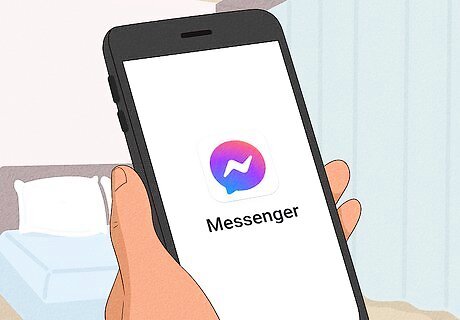
Go onto commonly used Gen Z communication/instant messaging platforms and forums. These are very similar to social media apps. Communication platforms are more for chatting with friends privately and talking with other people, whereas social media apps are for posting what you enjoy and allowing others to share their opinions on it. Joining these platforms allows you to make Gen Z friends and explore your interests. There are often many forums and servers for a bunch of topics, like gaming, solving puzzles, watching videos, etc. Commonly used Gen Z instant messaging platforms include Whatsapp, Facebook Messenger, and Discord.
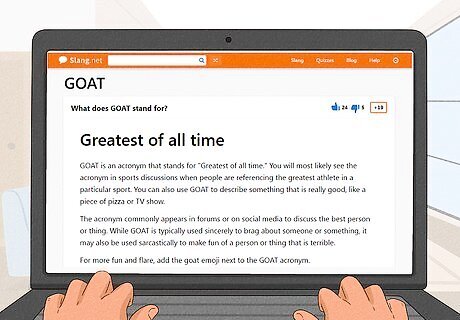
Use a slang dictionary to decipher slang. When you search for unfamiliar Generation Z slang, use a dictionary. Physical paper dictionaries, especially older ones, may not have slang and other recently added words. So, use an online one if you can. These have new slang terms and lingo. Use websites like Urban Dictionary, Slang.net, and Dictionary.com's slang archives for meanings of thousands of slang terms. Keep in mind that Urban Dictionary's dictionary definitions are not always neutral. They may also contain inappropriate words and incorrect grammar, so proceed with caution.
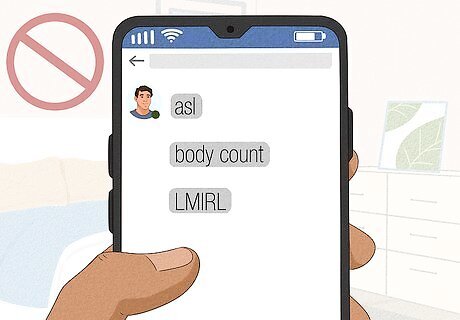
Be aware of red flags in slang-filled conversations. There are some slang terms that mean inappropriate or risky things. Watch online conversations carefully if you are talking with your friends online. If you're a parent or guardian, it doesn't mean that you should invade your child's privacy and go onto your child's online conversations daily- it just means that you need to be aware of what your child is saying online. Some slang words can indicate something risky or offensive. Asl - could mean "age, sex, location". Body count - how many people someone has had sex with. Kys/kms - kill yourself/kill myself. This should be taken seriously, as it could indicate a threat to someone's safety. If your friend or child was just joking, talk with them about their behavior, and how they should completely avoid the subject of death or other offensive topics in jokes. LMIRL - let's meet in real life Netflix and chill could mean an innocent night with friends watching Netflix, but it could also mean inviting someone over to have sex Mention of drugs ("X" and "Molly" could mean ecstasy, "the plug" could mean someone who supplies people with drugs, "vape" meaning to smoke an e-cigarette, "shrooms" or "magic mushrooms" being psychedelic drugs, etc.) Excessive cursing in in-person and online conversations Slurs of any kind




















Comments
0 comment